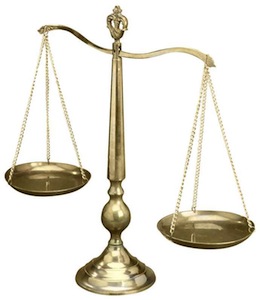- October 2, 2013
- Posted by: andreag
- Category: GrowthlinesHigh PerformanceLeadershipOrg CulturePerformance Management

We have reached the final edition in our series on Dann’s Principles of Management. This month we tackle the 9th Principle: Everyone will find fairness somehow. To view the list of all nine Principles, visit our introductory post to the Principles. Individual descriptions of Dann’s Principles 1-8 can be found using the links at the bottom of this post.
Now for Principle Nine. We human beings, at least the vast majority of us, have an innate sense of ethics or fairness. We don’t always act on it, but we know that when we don’t, it’s wrong. We also know this about others. We use this innate ability to evaluate all our relationships. Ask more of your spouse than you are willing to give, there will be trouble. Friendships, the same. So, for example, I have operated on a personal rule that I will loan someone money repeatedly if they pay me back, but fail to pay me once, and that is your last loan, my friend.
Fairness is part of the basic contract between employer and employee. I listened to my father complain about his being taken advantage of by his employer. His view was that those who contributed less but marketed themselves more were being promoted and given raises, while he was standing still in the later stages of his career. It most definitely impacted his morale, possibly his productivity. Can’t speak to the quality of his product, though knowing his self-pride, it likely didn’t.
The genesis of the labor movement
Unfortunately, while we humans have this built-in fairness barometer, we are also prone to greed. It was the greed of the industrialists in the early 20th century that led to exploitation of their work force. Unfair conditions, unfair compensation, etc. The reaction of the workforce was to create the union movement and, ultimately, fairness was achieved. Reasonable minds can argue about where we are on that pendulum now – some viewing unions as unfair; some the reverse. My view is that there are two current trends that bear watching: the decline of the unions (except in the public sector) and the growing disparity between executive and rank and file compensation. My take is that if this continues, we will exceed the general sense of fairness in employee ranks and there will be a reaction much like the early 20th century. We simply can’t replace all those workers with machines that have no innate sense of fairness.
Importance for individual leaders
OK, but what does this mean, if anything, for me as an individual leader? Well, individuals will take their own steps to achieve fairness when they feel they have been wronged. They will agitate for change, they will talk to others and sour them on the organization, they may slow down their work or worse yet, sabotage the work. In any case, they will not be at their best and won’t perform at their best. Even in contract relationships (and I have been in hundreds of them), if the terms are unfair to either party, the work will not go as well as it could and the relationship will be short lived. We like to work with those who appreciate our efforts. Exchange is the gauge we use to assess the level of appreciation. I know I work a lot harder for those who appreciate my work than I do with those who needlessly complain and try to get as much as they can for as little as they can. So, what are the areas that employees look to in evaluating fairness of their boss or employer? Here are some of them:
- Compensation
- Benefits
- Work conditions
- Expectations
- Raises and bonuses in comparison with performance of others whose performance is known
- Favoritism in a number of areas; workspace, trips, training opportunities
- Being given due credit for results
How to judge fairness
Fairness is a judgment, a perception. There are no hard and fast rules; it either feels fair or it doesn’t. Because of this innate ability we all have to evaluate fairness, the method I have used to determine if I am being fair is to simply ask, “what seems fair to you?” or “does this seem fair to you?” Quite frankly, I have never had someone exploit that opportunity to extract more than is fair. Rather, the most common response is “well, I’m not sure, what do you think is fair?” I know when I get that response that a) I have an ethical person before me, b) we will reach an agreement that works for both sides and c) the odds are very good that this will be a long standing relationship.
What to do?
Well, the suggestion above on negotiating is one thing, but let me back up. If you sense dissatisfaction and low morale in the workplace, look to whether you have been fair as a first diagnostic test. Simply ask the question. Ask sincerely, and you’ll get a sincere response. If a sense of unfairness is the problem, determine if there truly is an unfair situation or if perceptions are the culprit. Start with communication and move to changing leadership styles or policies or processes as are warranted to rebalance the scales.
The end of the series
This ends the series on Dann’s Principles of Management. I’m considering doing more writing on these and would welcome your feedback as to whether you found them useful, how they could be improved and the like. You can reach me by e-mail.
If you are interested in learning about Dann’s Principles 1 – 8, or the list as a whole, click on any of links below:
Introduction to Dann’s Principles of Management
Principle 1: There is Another Side to Every Issue
Principle 3: There are Politics in Everything, Everybody
Principle 4: Performance Set By Example
Principle 5: The Leader Truly Leads




